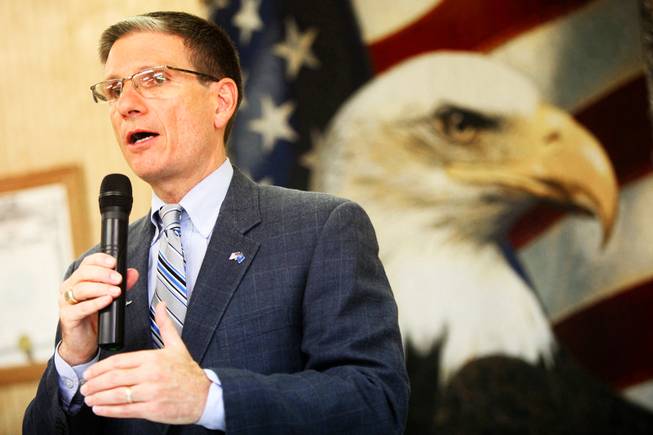
Rep. Joe Heck speaks to Veterans at the American Legion Post 40 in Henderson on Wednesday, June 8, 2011.
Wednesday, June 27, 2012 | 6:32 p.m.
On Thursday morning, in the moments before delivering the health care decision everyone’s been waiting for, the Supreme Court will make a judgment in a case you’ll probably ignore for the rest of the day.
How the justices rule, however, will determine whether Nevada Rep. Joe Heck is a better constitutional law scholar than former President George W. Bush and pretty much the entirety of Congress circa 2006.
The Supreme Court is set to rule Thursday on the constitutionality of the Stolen Valor Act, a law Congress adopted unanimously in 2006 that made it a federal misdemeanor to lie about receiving medals for military service, punishable by up to six months of jail time — or a year for anyone who lies about receiving the Medal of Honor.
The law was an expansion of an existing statute criminalizing the unauthorized production or sale of military medals and other decorations.
In making lying a crime, however, Congress may have run seriously afoul of the Constitution’s protection of free speech.
At least that’s what the 9th Circuit Court of Appeals decided last year, when confronted with the case of Xavier Alvarez, an habitual liar whose tall tales included claims that he’d played professional hockey in Detroit, that he had been an American ambassador during the Iranian hostage crisis, and that he had had a 25-year career as a Marines — all perfectly legal, if arguably reprehensible, fabrications.
But when Alvarez told the Panoma County, Calif., water board in 2007 he’d received the congressional Medal of Honor 20 years earlier, someone sent the tape of the meeting to the FBI. Soon after, he was charged with a federal misdemeanor, which a lower court upheld before the 9th Circuit overturned the ruling in 2011, arguing it trampled on Alvarez’s rights to free speech.
Heck offered a tacit endorsement of that ruling a few months later when he offered a new Stolen Valor Act that achieves almost the same ends as the one being challenged at the Supreme Court, while steering fully clear of the matter of speech.
Heck’s law makes it a crime to benefit from falsely claiming to have served in the military or have been decorated for that service.
Individuals who knowingly lie “with intent to obtain anything of value” would be subject to the same prison terms: Up to six months for basic lies about military service, and up to a year for lying about receiving the Medal of Honor, should those lies be told with the intention of gaining a job, a reward, or other thing of value.
The bill doesn’t specify exactly what “anything of value” is, though a de minimis clause in the bill suggests it couldn’t be applied if the thing procured by lying is of minimal value, such as a beer at a bar. The thing in question must also have a value that is quantifiable, so lies about military service told with the intention of getting the attention, a date, or something less gentlemanly with a person at that same bar is also likely not prosecutable.
Heck’s bill hasn’t yet been considered in committee. But it has been co-sponsored by the head of the Armed Services Committee, of which Heck is a member.
“I’m confident this approach will pass constitutional review and protect the individuals who have sacrificed to protect our freedom,” Heck said in a statement he released with the bill in 2011.
The court is expected to deliver its opinion in the case Thursday morning: U.S. v. Alvarez is the only case remaining on the court’s docket other than the much-awaited decision over the constitutionality of the Affordable Care Act.
The court has, in the past, endorsed a number of limitations to the First Amendment: Libel, certain kinds of obscene speech, incitement to violence and fraud are some of the categories that the court has ruled are not protected free speech; the court has also allowed certain restrictions on the exercise of free speech in public school classrooms. But for the most part, speech in open forum has to cause some kind of direct, tangible harm to be considered as unprotected under the Constitution.
While Heck's alternate Stolen Valor Act proposal broadens the scope of lies that can lead to a crime (the Stolen Valor Act the Supreme Court will rule on only concerns lies about medals, not military service in general), the lie only matters if it's being used to procure something physical — the sort of direct, tangible harm that would put such lies outside the realm of protected speech under the First Amendment.

Join the Discussion:
Check this out for a full explanation of our conversion to the LiveFyre commenting system and instructions on how to sign up for an account.
Full comments policy